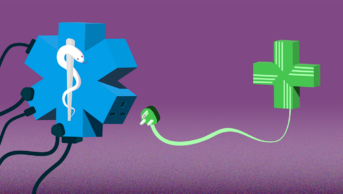
Shutterstock.com
Community pharmacists could have access to GP patient records by the end of January 2024, NHS England has said.
Speaking at The Pharmacy Show on 15 October 2023, Tahmina Rokib, digital primary care clinical lead for community pharmacy at NHS England, said that “dependent on negotiations”, community pharmacists could access medication, clinical investigation and observation information through GP Connect as part of ‘phase 1’ of a roll out to community pharmacies by “end of January [2024]”.
GP Connect is an NHS digital service that allows authorised clinical staff to share and view GP practice clinical information and data between IT systems.
As part of the phase 1 integration, community pharmacists will also be able to update patients’ clinical records through their pharmacy systems.
“The pharmacy IT system will send a coded message to the GP system that runs directly into their system,” said Rokib.
“So it’s not in an email, it’s not a PDF, it’s the coded information that will look as if a GP or somebody at the practice has typed it in themselves,” she added.
Rokib explained that once the coded message is sent to the GP clinic, this will then enter a standardised workflow.
“Somebody from the practice will need to action the message. Once they say yes, this is the right patient, we want to accept this message, the details of that message will be added to the GP record.
“What that means is if somebody then accesses that GP record in a pharmacy, the next day, they will be able to see the details of that consultation,” she said.
Rokib confirmed that the roll out will occur in four pharmacy patient medication record systems — Positive Solutions, Cegedim Healthcare Solutions, Sonar Informatics and EMIS Health Community Pharmacy.
“They’re really going to unlock what pharmacies can do in the future, because access to clinical records has been limiting pharmacy for a long time,” said Rokib, adding that the ‘phase 1’ roll out will be available for use as part of the NHS Community Pharmacist Consultation Service (CPCS), the NHS Community Pharmacy Blood Pressure Check Service and NHS Pharmacy Contraception Service.
Under ‘phase 2’ of the roll out, pharmacists will be able to access information on patient allergies, GP consultations and immunisations.
Addressing the limitations of the digital service, Rokib said: “There are a couple of caveats that I wanted to highlight. One is because you can retain information, there is a risk that you may assume data that’s previously been saved is the most up to date. We want to avoid that.
“You need to do a new call to the patient record so that you’re seeing the most up to date information,” she said.
“The GP Connect information that you’ll be able to access is only as good as what the GP has recorded in their system. So it may not capture, for example, medicines that’ve been prescribed for a patient in secondary care or a specialist clinic,” she added.
Rokib said the roll out of GP Connect to community pharmacies forms “part of the Primary Care Access Recovery Plan”, which was published in May 2023 and announced plans to invest an extra £645m in community pharmacy over the next two years.
The recovery plan included the introduction of a ‘Pharmacy First’ service for England, allowing pharmacists to supply medicines for seven common health conditions, including earache, sore throat and urinary tract infections, as well as an expansion of the NHS Pharmacy Contraception and NHS Hypertension Case-Finding services.
At a round table on independent prescribing hosted by The Pharmaceutical Journal in July 2023, Anne Joshua, head of pharmacy integration at NHS England, said access to GP records through GP Connect “will give [pharmacists] the best clinical assurance around activity related to long-term condition support”.
She added that giving pharmacies access to GP Connect will enable pharmacists “to view straight through to the GP record to see test results and patient observations” when prescribing.
James Davies, RPS Director for England, said: “Allowing pharmacists to access and update clinical records wherever they work is crucial for optimising the health and care workforce, reducing health inequalities, and enhancing patient care.
“With a new generation of pharmacist independent prescribers, it is high time the government accelerates the roll out of read-write access to patient records for all pharmacists.”


